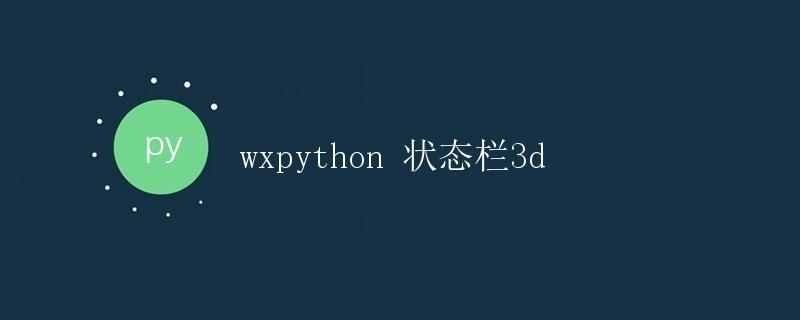wxPython 状态栏3D

在使用 wxPython 构建图形用户界面(GUI)时,状态栏是一个常用的组件,用于显示应用程序的状态信息、提示信息或者进度信息。在一些应用程序中,将状态栏设计成3D风格可以让界面看起来更加美观和现代化。本文将详细介绍如何在 wxPython 中实现一个带有3D效果的状态栏。
准备工作
在开始之前,确保你的系统中已经安装了 wxPython。如果没有安装,可以通过以下命令安装:
pip install -U -f https://extras.wxpython.org/wxPython4/extras/linux/gtk3/ubuntu-20.04 wxPython
在编写代码前,我们先创建一个基本的 wxPython 窗口,并添加一个简单的状态栏。接下来我们将对这个基础窗口进行改进,使其具有带有3D效果的状态栏。
import wx
class MyFrame(wx.Frame):
def __init__(self, parent, title):
super(MyFrame, self).__init__(parent, title=title, size=(400, 300))
self.InitUI()
def InitUI(self):
self.CreateStatusBar()
self.SetStatusText("Ready")
self.Centre()
self.Show(True)
if __name__ == '__main__':
app = wx.App()
frame = MyFrame(None, "3D Status Bar Example")
app.MainLoop()
以上代码创建了一个简单的 wxPython 应用程序窗口,并在状态栏上显示 “Ready” 文字。接下来我们将对状态栏进行进一步改进,使其具有带有3D效果。
实现3D状态栏
在 wxPython 中,我们可以使用 wx.lib.agw.gradientbutton 模块中的 GradientGloss 类来实现带有3D效果的状态栏。首先我们需要安装这个模块,可以通过以下命令安装:
pip install wxPython-rribbon
接下来,我们将修改上面的代码,通过 GradientGloss 类创建一个具有3D效果的状态栏。
import wx
import wx.lib.agw.gradientbutton as GB
class MyFrame(wx.Frame):
def __init__(self, parent, title):
super(MyFrame, self).__init__(parent, title=title, size=(400, 300))
self.InitUI()
def InitUI(self):
self.statusbar = self.CreateStatusBar()
self.SetStatusText("Ready")
gc_button = GB.GradientGloss(self.statusbar, -1, "3D Status Bar", size=(200, 20))
self.statusbar.PushStatusText("", 0)
self.statusbar.PushWidget(gc_button, 1)
self.Centre()
self.Show(True)
if __name__ == '__main__':
app = wx.App()
frame = MyFrame(None, "3D Status Bar Example")
app.MainLoop()
在上面的代码中,我们首先导入了 wx.lib.agw.gradientbutton 模块,并使用 GradientGloss 类创建了一个带有3D效果的按钮 gc_button。然后我们将这个按钮添加到状态栏中,并通过 PushWidget 方法将其推送到第二个位置。最终我们将会在状态栏上看到一个3D效果的按钮,代替了原本的文本。
通过这种方式,我们成功实现了一个带有3D效果的状态栏。你可以根据自己的需求进一步定制这个状态栏,例如修改按钮的颜色、大小、样式等。
 极客教程
极客教程